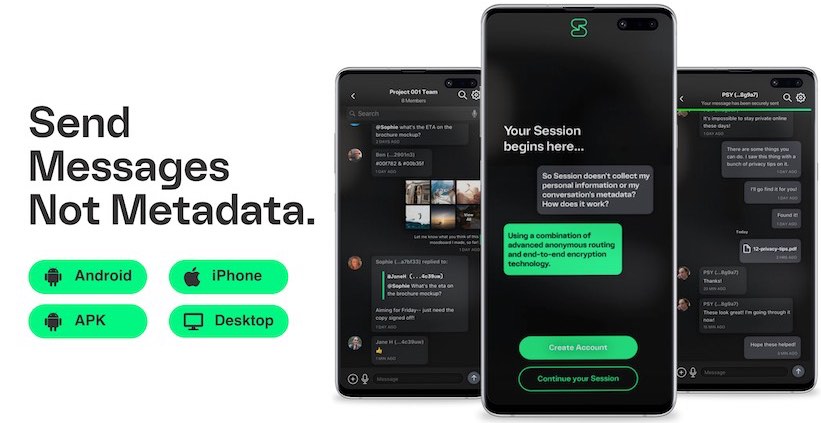
Session messenger is making a play for the position as the best secure messaging app. In this, it is going up against some intense competition from the likes of Signal and the other top apps we cover in our Best Secure and Encrypted Messaging Apps review. In this updated Session review, we’ll look at Session’s capabilities — both those active today and those comings soon.
Signal merits special mention in this Session review. That’s because Session is a fork of Signal, meaning that much of the guts of Session originally came from Signal. This is excellent since Signal has long been considered the most secure of the secure messaging services. Thanks to the excellent end-to-end (E2E) encryption provided by the Signal Protocol, Signal is about as secure as a messenger app can be.
But Signal isn’t as strong on privacy as it is on security. It collects some metadata and doesn’t have a corporate sponsor like Facebook sucking up and monetizing that metadata. More importantly, Signal requires you to submit a phone number to create an account. Signal also relies on central servers to manage message flow and hold the metadata it does collect.
Because Session is a fork of Signal, it inherited Signal’s strong security. From there, the Session team built an anonymized, decentralized system that provides superior privacy and anonymity for its users. Are you ready to learn more about this challenger for the throne of the best secure and private messenger app? Then let’s dive in with this Session review.
Session messenger basics
Behind the scenes, Session is fundamentally different than most other secure messaging services. To make the rest of this Session review easier to understand, we need to go over some basics now.
Conversations in Session are secured using client-side E2E encryption. Only the sender and the recipient of a message can read it. But Session goes beyond providing message security. Session also protects the identities of its users. It makes your communications private and anonymous, as well as secure.
Session can do this because it connects users through a Tor-like network of thousands of Service Nodes. Service Nodes are servers that pass messages back and forth through the network as well as provide additional services. The onion request system that Session uses to protect messages ensures that no Service Node in the network ever knows both a message’s origin (your IP address) and destination (the recipient’s IP address). This allows you to hide your IP by default.
Session takes a number of additional steps to protect your identity:
- No phone number is required for registration (unlike what we found in our Signal review)
- No email is required for registration (unlike with Wire messenger)
- No geolocation data, device data, or metadata is collected
The Service Nodes are grouped together into swarms. Swarms provide redundancy to the network as well as temporary storage when messages cannot be delivered to their destination. Each Session client connects to a swarm to send and receive messages in real time, as well as to retrieve relevant messages that are stored in the swarm awaiting delivery.
You’ll notice that we haven’t talked about any kind of central server here. The Session network is decentralized, with no single point of failure, and no main server for bad guys to hack. Session moves messages using an onion routing system.
In an onion routing system, messages are surrounded by multiple layers of encryption and pass through multiple nodes in the system. Each node decrypts a layer of encryption before passing the message along. Because of the way the messages are encrypted, no node can know both the origin of the message and its destination. Additionally, your IP address is never visible at the destination, meaning whoever you are conversing with has no way to identify you when you use Session. The Session service should prove to be very resilient, and continue functioning even as individual Service Nodes join or leave the network.
Session’s onion routing system runs on the Oxen Service Node network. This network (formerly known as Lokinet) also serves as part of the infrastructure for the $OXEN cryptocurrency. You can learn more about OXEN at the Oxen.io website.
While Session now handles basic messaging functions very well, it doesn’t have some of the features that competitors like Signal or Telegram do.
That said, it does now support voice and video calls, among other things.
That’s what you need to know to understand how Session works. background information, we’re now ready to talk intelligently about Session.
Here are the pros and cons that we identified in this Session review:
+ Pros
- End-to-end (E2E) encryption secures text and voice messages as well as attachments
- Encryption: Session Protocol
- Does not require telephone number or email address to sign up
- Open source
- Onion routing system provides decentralization and anonymity
- Does not log IP Addresses or metadata
- Encrypted closed groups and open groups
- Successfully completed security code audit of Desktop, Android, and iOS apps
– Cons
- Does not support 2FA (two factor authentication)
- Redesigned multi-device syncing
- Perfect Forward Secrecy removed
Important: The fact that Session doesn’t collect metadata is a huge plus. We consider the metadata issue to be the Achilles heel of many secure messaging services and secure email services. Even the most popular secure email services, such as ProtonMail, do not have a good solution to the metadata problem.
Now we’ll examine the key features of Session messenger.
Session feature summary
Here are features you’ll want to consider when evaluating Session:
- It uses the Signal-inspired Session Protocol, on top of a distributed onion routing system for anonymous, decentralized communication
- 100% open source code. (The code is available on GitHub.)
- Clients for Android, iOS, macOS, Windows, Linux
- The system is much more stable after several months of redesign and refactoring
Session company information
Session is a project of the Loki Foundation. The Loki Foundation (registered as LAG Foundation, LTD) is a registered charitable foundation based in Victoria, Australia. The foundation states that their purpose is to, “…build open-source, metadata-free communications tools and apps that defend privacy in the digital world.”
Note: Loki products are changing their name to Oxen. There will likely be an extended period of time where Loki and Oxen are used interchangeably.
Where is your Session data stored?
Messages that are sent to you are actually sent to your swarm. The messages are temporarily stored on multiple Service Nodes within the swarm to provide redundancy. Once your device picks up the messages from the swarm, they are automatically deleted from the Service Nodes that were temporarily storing them.
Note: This is not the same as a peer-to-peer architecture. Per the Session FAQ here,
Session clients do not act as nodes on the network, and do not relay or store messages for the network. Session’s network architecture is closer to a client-server model, where the Session application acts as the client and the Service Node swarm acts as the server. Session’s client-server architecture allows for easier asynchronous messaging (messaging when one party is offline) and onion routing-based IP address obfuscation, relative to peer-to-peer network architectures.
Third-party testing and audits of Session
Session now uses its onion routing network. Last year they commissioned a security audit of the Session Desktop, Android and iOS apps by Quarkslab. That audit is now complete and provides good news for Session and its users. The audit report concludes in part with the following:
Oxen Session really improves Signal privacy and resilience by using an overlay network to the existent end-to-end encryption instant messaging solution. The onion-routing mechanisms make use of Oxen’s Snodes to store and exchange messages, however, there are some other centralized standard web services that are still used through the overlay network (for the push service and to deliver attachments files). All major concerns have quickly been fixed.
Quarkslab Oxen Session Audit, Technical Report
Session is now suitable for use in cases where proven and independently verified security is a prerequisite.
Session hands-on testing
For this update of the Session review, I installed the Android app, along with the Windows desktop client.
Session Android app
I downloaded the Session Android app from the Google Play store. At that time the app had 1149 reviews and was rated 3.9 out of 5 stars (on the Apple App Store, Session Messenger had 120 reviews with a 4.4 out of 5 stars rating).
Launching Session highlighted one of the key differences between it and Signal: no need to enter a phone number or email address. Instead, Session gives you the opportunity to create an account by generating a Session ID, or by signing in to an existing account (by entering an existing Session ID).
A Session ID is a unique address people can use to contact you on Session. As Session explains, the reason using a Session ID is better than using a phone number or email address is, “Your Session ID is totally private, anonymous, and has no connection to your real identity.” Signal and other messaging apps that identify you with a phone number cannot give you this anonymity.
Once you create a Session ID, Session will ask you to pick your display name, and tell Session how to handle push notifications. And once that’s all done, Session will show you your Recovery Phrase and give you the opportunity to store it somewhere safe.
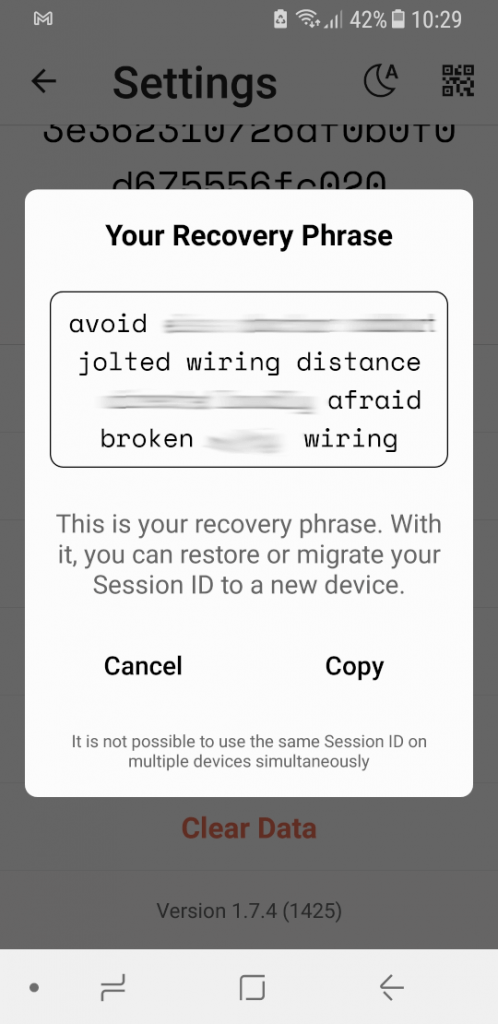
A Recovery Phrase is a string of words that you can enter to recover your account if you lose the Session ID, or change to a new device. To restore your Session ID, launch Session and tap Continue your Session. Session will give you the opportunity to enter your Recovery Phrase and get back to where you were when you last used that Session ID.
With all that out of the way, you are finally ready to start working with Session.
Working with Session
At first, Session will seem pretty dead. That’s because you still need to connect with people. While a service like Signal, you can scan your phone’s contact list looking for phone numbers that are registered as Signal users, Session needs you to tell it who to connect to. You do that by creating a New Session. A New Session is a chat session that you initiate by entering the Session ID of the person you want to chat with.
How do you know the Session ID of the person you want to chat with? You either get them to give it to you, or you scan a QR code that contains their Session ID. Unless you happen to be physically located in the same place, thereby able to pass the Session ID or display the QR code directly, one of you will need to share your Session ID with the other to get this thing started. You’ll need to use a different communication medium (another secure messenger app, perhaps) to make this happen.
Once you enter someone’s Session ID, you can send them a message. Once they accept it, you can freely exchange messages like any other chat app.
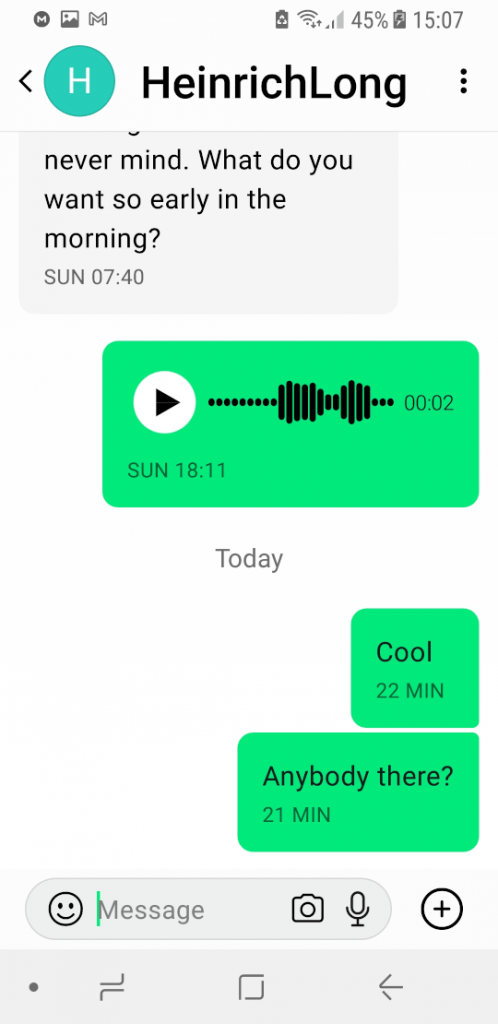
Tapping the icon for a contact opens your ongoing chat session with that contact.
Beyond basic chatting, Session has a number of additional useful features. Here are some of them:
- Encrypted groups – Create closed groups (up to 10 people previously; now up to 100) or huge open groups (no size limit).
- Voice messages – Create and share encrypted voice messages.
- Attachments – Message attachments are encrypted too.
- Safety Numbers – Verify that you are communicating with the device you expect to be talking to by comparing safety numbers.
- Video and Voice calls – This is a relatively new feature that puts Session on par with Telegram and Signal.
Session Desktop clients
We installed the Session Desktop client on our Windows 10 test machine.
Session Windows Desktop
Downloading and installing the Sessions Windows Desktop client follows the standard “install a Windows app” process.
Note: If you want to use the Session Linux Desktop, you’ll need to install it as an AppImage. If you don’t know how to work with this portable Linux file package, click this link for a short video tutorial.
Running and configuring Session Desktop
Once you’ve got the desktop downloaded and installed, you need to fire it up. You’ll want to connect your desktop client to your mobile device. You can do this by selecting Sign In, instead of Create Account, then selecting Link Device to Existing Session ID and following the instructions. The Session desktop apps I tested for this review were easy to use to get going and use.
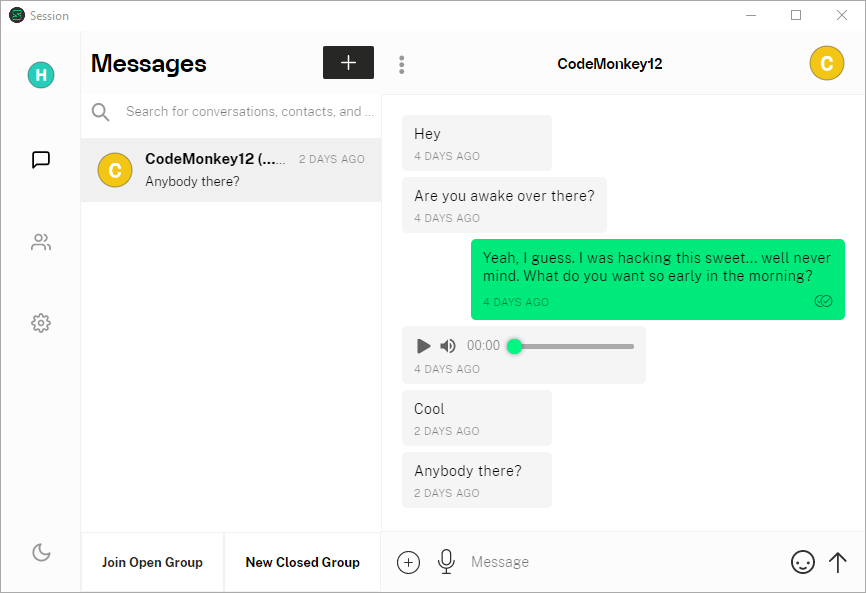
Note: Once you get the desktop app up and running, you will need to enter your contacts again. That’s because Session multidevice isn’t ready yet.
With the volume of changes coming out of the Session team, it can be hard to keep track of all the feature changes. If you intend to use this product, we suggest that you make time to check the Session blog to keep up with the ever-improving feature set of Session.
Support
Session’s support area reminds me a lot of Keybase. There’s an FAQ page, and the blog that I just mentioned, rather than a regular Support page like you would find for a paid product. The FAQ is pretty useful, although a little sparse (not surprising for a product that is still under heavy development).
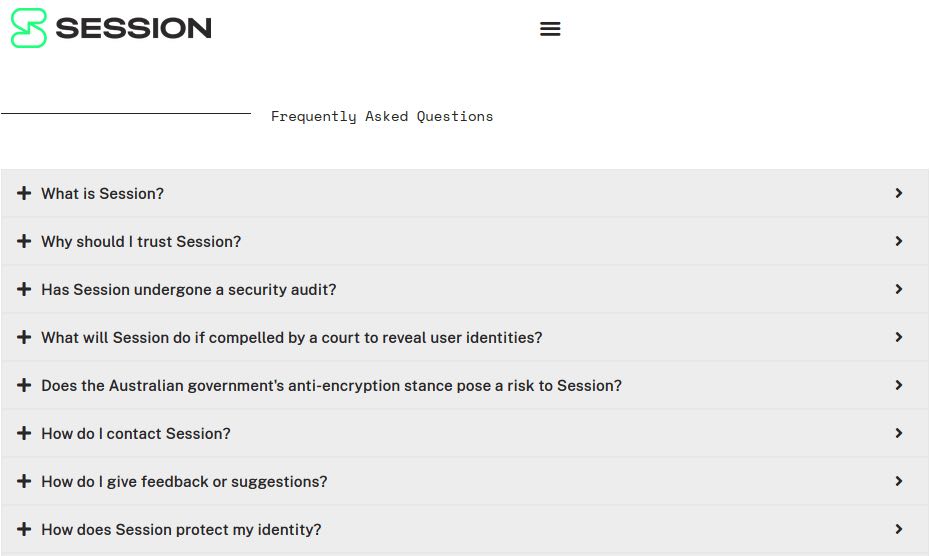
If you have questions that the FAQ can’t answer, the company does offer email support and social media contacts. They also have links where you can report bugs and look for solutions. But those all take you to GitHub pages where you can look at the code and check existing issues pages. This is okay for techies, but it’s likely to confuse some regular users.
How secure and private is Session?
Once Session is completed and fully developed, it should be super secure, extremely private, anonymous, and generally excellent. However, it is unclear how far close to complete the product really is.
The onion routing system is now functional, which is a big boost for security and privacy. And the Quarkslab security audit shows that the Desktop, Android, and iOS apps are all secure.
Concerns about Australia and data security
On the topics of privacy and the security of your data, we must discuss where Session is based. As noted above, Session is based in Australia. Unfortunately, Australia is not a very good privacy jurisdiction for a few reasons.
As we recently discussed in our guide on the best VPNs for Australia, the country passed a law to undermine encryption and data security in 2018. Here’s a quick overview of this law:
The Australian Parliament passed a contentious encryption bill on Thursday to require technology companies to provide law enforcement and security agencies with access to encrypted communications. Privacy advocates, technology companies and other businesses had strongly opposed the bill, but Prime Minister Scott Morrison’s government said it was needed to thwart criminals and terrorists who use encrypted messaging programs to communicate.
In privacy circles, the “Assistance and Access Bill” is sometimes called the “encryption-busting law” or the “anti-encryption law” because of what it allows. This law would fundamentally affect businesses that provide encrypted communication services, including Session, VPN services, and other privacy-focused businesses. This topic continues to garner criticism from privacy advocates around the world.
In taking a page out of the Australia playbook, US regulators have also proposed forcing tech companies to break encryption, thereby facilitating surveillance.
The Loki Foundation that is behind Session addressed this thorny issue in a blog post:
Obviously, we were terrified when we first saw this bill. The potential for the project to be entirely undermined by this legislation did not go unnoticed. We had begun to consider how we might set up failsafes to allow people to catch bad code being injected into our codebase, or to pay someone external to Loki to do regular inspections of our binaries that we release and ensure they are not leaking extra information or mismatching the codebase in some way. If we were to be issued a TCN [Technical Capability Notice], we would not be able to tell anyone about it. If we set up some sort of canary system, we could be imprisoned. So whatever failsafe we did set up would have to be external to Loki, and would have to be regularly auditing us to make sure we haven’t been compromised before a TCN was issued.
Ultimately, the Loki Foundation believes they can still operate a secure messenger service in this perilous legal environment. Their blog post on the topic really goes deep into technical and legal details, which you can investigate if you have the time and inclination. In addition, they address the issue in the FAQ topic titled, ” Does the Australian government’s anti-encryption stance pose a risk to Session?” as well as in this update to their original blog post.
So is your data safe and secure with Session messenger?
I have my doubts after researching the Telecommunications and Other Legal Amendment (Assistance and Access) Bill 2018, commonly known as the AA bill or TOLA, but you can come to your own conclusions.
Other privacy concerns with Australia
It’s also worth noting that the anti-encryption legislation is not the only privacy issue that plagues Australia. Consider this:
- Mandatory data retention – In 2017, Australia implemented a mandatory data retention framework. This forces all internet providers and telephone companies to store connection data for government agencies for a full two years.
- Five Eyes – We have also noted before that Australia is a member of the Five Eyes surveillance alliance. This alliance works together to collect and share mass surveillance data.
And if you think that various agencies are not exploiting these laws to collect data on Australians, think again. Here is a recent headline from The Guardian:

Due to metadata collection laws in Australia, it’s great that Session makes every effort to not collect any metadata. However, it’s also clear that everyone in Australia should be using a non-Five Eyes VPN service such as NordVPN or Surfshark to encrypt and anonymize web browsing activity.
Session business features
Like its ancestor, Signal, Session doesn’t have any business-specific features or versions at this time. If you are looking for business features, check out our Wire review.
Session prices
Session is free and open source software. There is no charge for using Session and as far as I can tell, no plans to charge for the product in the future.
This is similar to what we noted in the Signal review.
Session Messenger FAQ
Here are a few questions that came up frequently during the research and writing of this update.
Is Session messenger safe?
The recently completed security audit by Quarkslab has confirmed what we long believed: Session is secure. But the actions of the Australian government to get around privacy protections on pretty much any app or service (not just Session) makes us feel that your privacy can’t be guaranteed if you use Session.
What is the Session protocol?
The Session protocol is a new messaging protocol developed by Session. Switching from the Signal protocol to the Session protocol keeps the security of the latter while providing privacy/anonymity and decentralization features. The result is a protocol that works well with Session’s unique architecture.
Session review conclusion
Session is a promising product, but it comes with Pros and Cons. Once complete, it should be just as secure as Signal, even more private than Signal, and anonymous as well. But there are still lingering concerns about Australia, data privacy, and the Loki Foundation’s ability to keep user data secure in this environment.
Based on the testing I did for this updated review, I am very impressed with the technical side of this project. The onion routing system is up and running, and the refactored apps work well. I haven’t run into any errors or been disconnected from the other party, as happened frequently during our initial test phase. It will be nice when the multidevice feature is out of beta, but that’s not a deal breaker. Functionally, Session seems ready for regular use.
The problem I see is with the Australian government. Even before they imposed the scary TOLA bill, Australia was a bad jurisdiction for privacy lovers. Five Eyes membership, mandatory data retention, and TOLA combine to make us advise choosing a messenger that isn’t based in Australian jurisdiction.
Is Session right for you?
Session works and works well. But if you want privacy in addition to security, you should probably look elsewhere. Here are some more secure messenger reviews.
This Session messenger review was last updated on April 27, 2024.

Session is now in Switzerland! 🤩
I will use Session as soon as they move out of Australia to a more privacy-friendly country.
No such country exists.
As things are, Session is the next step in the goal of developing a truly decentralized and censorship free global network… it’s coming. In the meantime Session is the best, IMO, having studied this topic for a couple decades now.
Wish granted 😉
https://getsession.org/blog/introducing-the-session-technology-foundation
They are in Switzerland
Update:
Video and voice calls are now available on Session, but the user experience is terrible. I can only connect about 2 out of 10 times when making calls.
Keet.io and WireMin are much better choices if you’re looking for stable encrypted calls on such platforms
Any way of transmitting videos larger than 10 frustrating mb?
Unfortunately not. Your best bet is re-encoding at lower sample and frame rate, lower resolution and quality, flattening to mono-channel audio, etc.
Could someone make session etc have a direct file transfer where the devices link directly through the internet and communicate super encrypted?
Try Onionshare (https://onionshare.org/). Uses TOR routing. Comes packaged with Tails OS but you can download for desktop use. Everything stays within the “hidden services” (Onion services) so no exit node is involved. Onionshare >= 2.6 also includes secure chat/messaging. Tails 6.7 has that version (https://tails.net/latest/index.en.html)
hey i am pretty sure he said that u need to install it as an AppImage on linux he even gave u a link tutorial https://youtu.be/nzZ6Ikc7juw
Upload videos on Mega and just share the link on Session.
This is completely unrelated and useless so feel free to ignore but wouldn’t it kinda be funny to develop an open source “malware” that turns your bluetooth off and on every 30 mins just to troll your friends? (apple only likely)
Session is a good alternative to communicate with privacy. The world of today and in the future, privacy and anonymity are gold when more and more govs ans states become dictatorships going to communism direction what we historically know tha ends in a dictatorship or non free speech! They calls democracy but is a bust! Just a IngSoc lke in 1984! So we need more and more solutions private and anonymous to restore or freedom, the real sense of democracy and stay free from a reality like in China and North Corea. Lokinet, Session and many other can help us!
Not trying. To be mean just wanted to let you know it’s Korea I know you probably don’t care but never know
so you downloaded it with google play store and think you’re private when google is already tracking you?
and you don’t need 2FA as the purpose of it to remain anonymous
leave no identity so nobody else will know who they are tracking
If you’ve downloaded a offline file & installed, particularly on a AOSP version, then there won’t be any Google tracking in theory.
Don’t knock the fact people have downloaded Google Play dude, 80% of people are normies, 18% are the pack & 1-2% are the individuals. Just getting people onto Signal Messenger from the Play Store is an accomplishment, nevermind using a more advanced messenger like Session.
does google know the session ID that’s randomly created AFTER you download and install the app? well they might if you’re not running graphene or lineage OS
My Linux distribution says that Session, as downloaded with Software, “Can read/write all your data; Uses a legacy windowing system”.
So I guess people won’t like to install such an application, which could read all their data. How can they be sure that the version donwloaded from the Session website is better?
Heinrich, have you seen the french olvid.io ?
u think that is secure? since the CEO of Telegram was detained and interogated in france for 4 day because this company data basé wasn’t store the numbers and the IP? he was kinda forced to change a little the way was once telegram worked now if it’s a suspicion of unlegal activity if he recive a legal warrant they will be no other way then give information about user such as phone number and IP adress soo idk what to say about france either
What about other Signal forks like Molly IM, Silence (F-droid) or new techs like Berty, SimpleX Chat, Serval Project (Mesh)? Or better FireChat alternatives like new Bridgefy, BriarProject, White Mouse Private.
Arti,
Silence was a good one. Hasn’t been updated for at least three years.
“In short, the laws in Australia are not a direct threat to Session and the government just changed, so the specific person who was pushing all these ridiculous laws has moved out of that role. So the future looks more understandable and thought out towards technology and encryption laws.”
Yes, it gets better.
Why doesn’t Session incorporate itself outside Australia now just to be safe?
well, they have family and kids, they are born and raised there. Its their country. Its not easy to relocate for some.
Not emigrating, just re-register the company at different country like In the EU or Ireland.
they should just make it decentralised.
enables big files too.
Well, they’ve done it now, after one of their employees got a visit at home from the AFP. I’m not sure that incorporating in Switzerland is going to be enough.
Thanks for the great review!
Here are more “cons” to session:
[https://www.freie-messenger.de/en/warumnicht]
And some more additional information …
Messenger quick overview (PDF downloadable in multiple languages):
[https://www.freie-messenger.de/en/systemvergleich]
Thoughts on “Alternatives to WhatsApp”:
[https://www.freie-messenger.de/en/messenger/gedanken]
And lastly, a unique overview of messenger comparisons:
[https://www.freie-messenger.de/systemvergleich/externe_vergleiche/]
I tried Session and it’s interesting but Australian law leaves me in doubt. I have doubts about some google libraries used in Session (android). I use *Tox with satisfaction but very few people use it.
All have failed to note the other elephant in the room here .. the COMRADES in power in USA are just as dangerous as Australia .. or worse .. as they have taken many lessons on destruction of freedom and privacy and security from China ..
Just sayin ..
Are there better alternatives to Session which contains the missing parts (PFS, self-healing, etc.)?
SimpleX Chat, I guess.